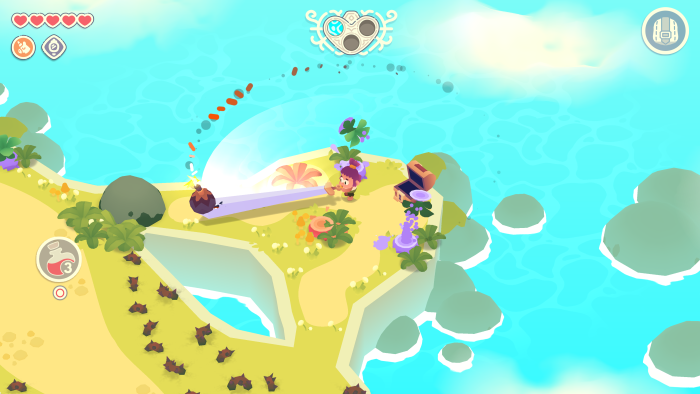A novel take on Zelda-like action adventure games where we control the sword, not the hero
Originally released in 2020 on Apple Arcade, Big Green Pillow’s Slash Quest, a unique take on a twin-stick Zelda-like, has finally come to Android, PC, and Mac hardware this July. As someone who doesn’t have an iOS device I hadn’t even heard of it until it popped up on my Steam discovery queue, not even realizing it was an older mobile game until later into my experience with it. But did it come with the limitations of what’s typically present in games originally created with mobile devices in mind, or do new control options let us experience an even better game?
In atypical fashion we play as Swordie, a sentient, talking sword who enlists the help of Shepherd the young sheep farmer to reunite it with his missing Queen. It’s the sword who is in control and the boy’s along for the ride. Movement is limited to forward movement via the A button, and pushing left or right on the analogue stick swings the sword, which determines our direction. It feels reminiscent of someone using a dowsing rod and letting it pull them toward their objective, which initially feels weird but quickly clicks.
With each enemy the sword vanquishes it will grow in length, which is used to reach previously inaccessible objects like levers needed to turn a bridge or campfires that set the blade on fire, (which is used to burn away thorns barring our progress). This is where it feels most like a Zelda game, using the sword in unique ways to solve puzzles. There are even bombs that the sword can carry to blow up rocks or hurt enemies. It continually throws new concepts into the mix the further we get, but I won’t spoil those.

Certain objects like levers or devices to grab onto with the sword will deplete its length to the default size, requiring us to kill more enemies once again; hitting rocks will also do this. We won’t get softlocked either as certain areas will keep spawning enemies until the sword is long enough to complete a puzzle. It’s a smart way to keep the gameplay fresh, as otherwise each puzzle would be instantly solvable. That’s not to say puzzles are ever challenging to begin with; they’re not. It wasn’t until the last level that I discovered two puzzles that weren’t a cakewalk, both of which were optional and some of the hardest of their kind in any video game of this ilk. It made me wish there had been more like them spaced throughout my experience.
Each world has its own environmental theme like ice or fire, with an added boss at the end. Throughout the game we’ll rescue NPCs, whom act as merchants and quest givers, as well as adding challenges and minigames to our adventure. I was constantly surprised how often just one rescued character exponentially increased the replay value of the game. My personal favorite addition, however, was a postman who has us find lost items in a specialized challenge level upon completion of a world; these usually had a unique puzzle element not found elsewhere in the game.

If there’s one criticism I can lay at the Steam version of Slash Quest’s feet is its lack of challenge. I never died or felt close to dying, hardly ever needing to use a health potion. It wasn’t until I tried the mobile version that I realized why that was: the imprecise nature of controls common with virtual buttons on mobile games required certain design choices to be implemented to alleviate unnecessary frustration, such as not being able to fall off any ledges; there’s an invisible barrier keeping us from taking damage that way. With the usage of either a gamepad or keyboard the game is a cakewalk on PC, and it has no difficulty options to scale the challenge in one way or the other.
In the end, though, this game shows that challenge isn’t always paramount to making a good game. Sometimes all that’s needed is a fun time, with some extra modes sprinkled in. A good example of this Nintendo’s Kirby franchise, never hard but always fun and endearing, and something Big Green Pillow understands to great effect. With a price that can’t be beat for a game that never overstays its welcome, there’s really no excuse to pass up Slash Quest on PC.
This review is based on a Steam code sent to SideQuesting by the publisher. Images and video courtesy publisher.


No Comments